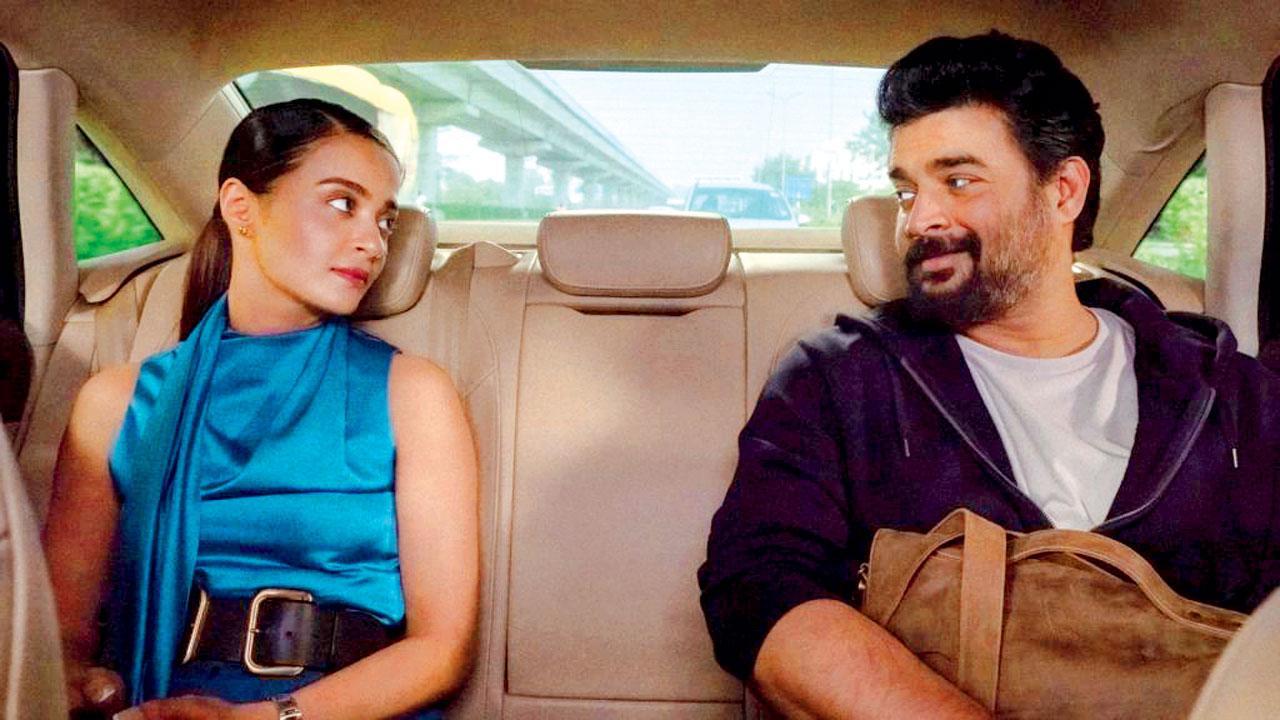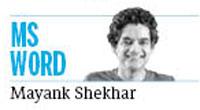Beauty of following a columnist for too long, you can begin to read their mind. Manu Joseph is that sorta friend!

Decoupled seems slightly staccato, if not rehearsed-even conversationally fake in English
 Although he can look the part, actor R Madhavan, India’s No. 1 man next door—‘paavam’ engineering type desi parents will like their daughters married off to—is not sloppy enough to be Larry David from Curb Your Enthusiasm.
Although he can look the part, actor R Madhavan, India’s No. 1 man next door—‘paavam’ engineering type desi parents will like their daughters married off to—is not sloppy enough to be Larry David from Curb Your Enthusiasm.
ADVERTISEMENT
In the Netflix series, Decoupled, directed by Hardik Mehta, Madhavan plays a role similar to self-referential Seinfeld creator David—a married, full-time writer, both full of himself, and profound plus pointless observations on the mundane; sounding inevitably ‘judgy’/jerk/inappropriate to others. David, I suppose, got it from Woody Allen.
Mehta pulled off the same acting beats better in his debut feature, Kamyaab, set in the Bombay film industry—baap-actor Sanjay Mishra had much to do with it.
Decoupled seems slightly staccato, if not rehearsed—even conversationally fake in English, sometimes. Which is true for many performers otherwise experienced in Hindi before a camera. As with those here. Madhavan is a Tamil actor too. It seldom flows. Or maybe the scenes don’t.
This isn’t to suggest Decoupled, set in Gurgaon’s gated high rises—honouring “the great Indian tradition of keeping one gate closed”—should be primarily in any language but English. It’s written/created by Manu Joseph. This is his TV/OTT debut.

Manu Joseph. Pic/Instagram
Technically, writing’s writing. And while Joseph has written three acclaimed books, a film (Love Khichdi) that I haven’t seen, and surely lots of emails, WhatsApp texts—he’s top of mind, among many English readers, as a weekly zeitgeist columnist. To my mind, the finest Indian, eclectic columnist.
I guess because he repeatedly passes tests of risky opinion. That is, to hold it against your own—meaning, the Op-Ed consensus, on GM foods to Aadhaar-related privacy issues, farm laws to Facebook’s free Internet!
A cynic imagining worse about those acceptably good—consequently breaking ranks with lit-fest holy coteries, on occasion. In this case, also jazz loving gatekeepers of what qualifies as gentrified art, and sufficiently bleeding-heart journalism.
The retaliation from this lot to directly being called out, from among near ones, is sharper still. Only marginally less than trolls demanding economic ruin of those, whose views they wish to shut down.
Well, you never have to agree with Joseph. Only the dumb read everything merely to nod and concur. Or revolt. He passes the more essential writing test—of being interesting; almost always. As Madhavan’s character Arya puts it in the series: “Writers are interesting, [because] they don’t know much about any subject to be boring!”
In random conversation, he picks up one of Joseph’s pet peeves from print—Rahul Dravid. Reflecting the Indian middleclass’s love for the cricketer as a projection of their own mediocrity, that values persistence, over excellence; or perhaps art over entertainment?
Kinda staying more on the subject, he mocks the excessive self-righteousness, of farmers, psychologists, gurus, activists, economists; the “NDTV crowd” and the “trauma industry”, as it were—all of it through stray lines, and caricaturing scenes.
You could misconstrue Arya, in the mirror image of Joseph, as a muckraker, or misanthrope. Latter is unfair. No misanthrope will ever care to write!
Decoupled is centrally about an ex-couple—the attractive Surveen Chawla plays the wife—as likely best friends, even flat mates: A concept that will befuddle ancestors. They’ve sanctified this “complicated relationship”, in Facebook speak, as marriage, forever. Which relationship isn’t complicated, outside of the Indian cricket team and its fans!
Let alone plot (and that’s for you to watch, or not), what follows better is a series of contentious conversation starters for a halting monologue.
“Anything that a man does for his lover is, in one way or another, paying for sex.” “Marriage is a cage in a deep, dark, dangerous forest—sure, you can escape the cage, but can you survive?” “The human brain is programmed to remember trauma more than happiness—so most marriages might be happier than couples remember…”
I guess viewers scrolling on Netflix might enter it better without excess baggage/expectations—chewing gum, for the brain. Not over-judging it even as intellect having sufficient fun, with something low on brow/ambition, cinematic and otherwise.
There are various ways to watch a show. I just haven’t randomly caught anything, lazing in bed, counting an entire series as a sum total of column openers for observations as dialogue! Stand-up comedy is a bit like that. This is ‘stand-up anthropology’, as was Joseph’s Facebook page once (if I recall right).
As for Madhavan’s zero-filter character, who should’ve been named Manu, and his thoroughly second-rate Larry David-like quirks—not shaking hands with teenage boys, for wherever they’ve been; or hating on restaurant waiters who interrupt table conversations.
We all have better ones, I guess. Mine’s to judge a writer for what they drink. Amitav Ghosh has never been the same to me, since I saw him with red wine in an airline glass at the dive-bar Ghetto. I remember Joseph holding pina colada over a night once. He’s a much cooler writer than a drinker, evidently!
Mayank Shekhar attempts to make sense of mass culture. He tweets @mayankw14
Send your feedback to mailbag@mid-day.com
The views expressed in this column are the individual’s and don’t represent those of the paper.
 Subscribe today by clicking the link and stay updated with the latest news!" Click here!
Subscribe today by clicking the link and stay updated with the latest news!" Click here!







